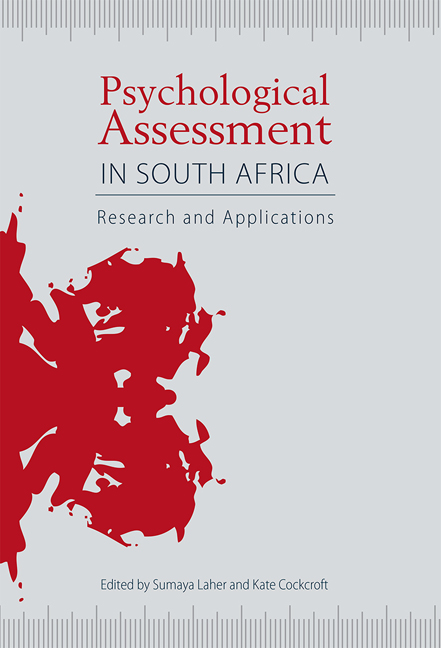Book contents
- Frontmatter
- Contents
- Tables and figures
- Acknowledgements
- Acronyms and abbreviations
- 1 Contextualising psychological assessment in South Africa
- Section One Cognitive tests: conceptual and practical applications
- Section Two Personality and projective tests: conceptual and practical applications
- Section Three Assessment approaches and methodologies
- 28 Ethical perspectives in assessment
- 29 Using computerised and internet-based testing in South Africa
- 30 The ImPACT neurocognitive screening test: a survey of South African research including current and projected applications
- 31 A family consultation model of child assessment
- 32 Qualitative career assessment in South Africa
- 33 Psychological assessment and workplace transformation in South Africa: a review of the research literature
- 34 Assessment of prior learning: a South African perspective
- 35 Large-scale assessment studies in South Africa: trends in reporting results to schools
- 36 Current and future trends in psychological assessment in South Africa: challenges and opportunities
- Contributors
- Index
30 - The ImPACT neurocognitive screening test: a survey of South African research including current and projected applications
from Section Three - Assessment approaches and methodologies
Published online by Cambridge University Press: 21 April 2018
- Frontmatter
- Contents
- Tables and figures
- Acknowledgements
- Acronyms and abbreviations
- 1 Contextualising psychological assessment in South Africa
- Section One Cognitive tests: conceptual and practical applications
- Section Two Personality and projective tests: conceptual and practical applications
- Section Three Assessment approaches and methodologies
- 28 Ethical perspectives in assessment
- 29 Using computerised and internet-based testing in South Africa
- 30 The ImPACT neurocognitive screening test: a survey of South African research including current and projected applications
- 31 A family consultation model of child assessment
- 32 Qualitative career assessment in South Africa
- 33 Psychological assessment and workplace transformation in South Africa: a review of the research literature
- 34 Assessment of prior learning: a South African perspective
- 35 Large-scale assessment studies in South Africa: trends in reporting results to schools
- 36 Current and future trends in psychological assessment in South Africa: challenges and opportunities
- Contributors
- Index
Summary
In recent decades, the development of computerised neurocognitive screening has revolutionised medical management in the sports concussion arena by making possible preseason (baseline) testing of large numbers of athletes, and repeat follow-up testing of the concussed athlete, to monitor recovery and facilitate safe return-to-play decisions (Moser et al., 2007). The aim of this chapter is to introduce the most widely employed instrument of this genre, the ImPACT (Immediate Postconcussion Assessment and Cognitive Testing) test (Iverson, Lovell & Collins, 2002), and to review the available South African normative research data in respect of the instrument to date. While the test has potential for wide application beyond the sports concussion arena (as discussed in the concluding section of this chapter), its development within the sports injury context calls for background detail in this regard.
Mild traumatic brain injury (concussion) in sport
Mild traumatic brain injury (MTBI), typically referred to as ‘concussion’ in the sports arena, is a common feature amongst both amateur and professional sports alike (Cassidy, Carroll, Peloso, Borg & Von Holst, 2004). While once considered to be a ‘routine risk’ associated with participation in the game, the impact of these injuries has gained significant international interest and concern amongst sports and health professionals in the past three decades (Barth et al., 1989; Collins, Lovell & McKeag, 1999; Shuttleworth-Edwards, Border, Reid & Radloff, 2004), and is currently considered by the Centers for Disease Control and Prevention (CDC, 1997) to be of epidemic proportions. The incidence of the concussive injury varies widely depending on the sport, such that in one comparative high school study US football accounted for 63 per cent of all cases, wrestling for 10.5 per cent, girls’ soccer for 6.2 per cent, boys’ soccer for 5.7 per cent, girls’ basketball for 5.2 per cent, boys’ basketball for 4.2 per cent, softball for 2.1 per cent, baseball for 1.2 per cent, field hockey for 1.1 per cent and volleyball for 0.5 per cent (Powell & Barber-Foss, 1999).
- Type
- Chapter
- Information
- Psychological Assessment in South AfricaResearch and Applications, pp. 443 - 460Publisher: Wits University PressPrint publication year: 2013



